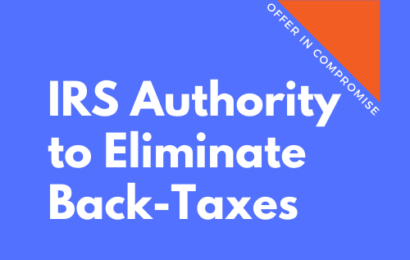
- Instructor: Attorney Bob Schaller
- Lectures: 9
- Quizzes: 1
Overview of the Offer in Compromise Application Process.
This course focuses on a taxpayer’s ability to eliminate past-due federal income tax liability by establishing a repayment plan through the IRS “Offer in Compromise” program, which is commonly known as the “Fresh Start Initiative.” An overview is presented to help navigate the labyrinth known as the Internal Revenue Code (the “Tax Code”) and its concomitant Treasury regulations, Internal Revenue Manual, Policy Statements, Revenue Procedures, and IRS Notices. This course explains the procedures applicable to the submission and processing of offers to compromise a tax liability under Section 7122 of the Tax Code, 26 U.S.C. § 7122.
The Tax Code authorizes the Secretary of the Treasury or his/her delegate to compromise any civil or criminal liability arising under the internal revenue laws before the case is referred to the Department of Justice for prosecution or defense. 26 U.S.C. § 7122. The IRS is a delegate of the Secretary of the Treasury. For a discussion of jurisdiction, review 26 C.F.R. § 601.203. The Secretary of the Treasury has issued Treasury regulations that promulgate guidelines and procedures for the submission and evaluation of offers to compromise under 26 U.S.C. § 7122. These guidelines can be found in 26 C.F.R. § 301.7122-1, the Internal Revenue Manual, revenue procedures, and various forms and publications issued by the IRS.
It is important to note that the Internal Revenue Manual (“IRM”) does not have the force of law and does not confer rights on taxpayers. Fargo v. C.I.R., 447 F.3d 706, 713 (9th Cir. 2006); Carlson v. US, 126 F.3d 915, 922 (7th Cir. 1997). It is well-settled that the provisions of the Internal Revenue Manual (“IRM”) are “directory” rather than “mandatory,” are not codified regulations, and do not have the force and effect of law. Marks v. Comm’r, 947 F.2d 983, 986 n.1 (D.C. Cir. 1991).
Only the IRS may process an Offer in Compromise, and only under the various regulations, rules, guidelines, and revenue procedures established under 26 U.S.C. § 7122. In re 1900 M. Restaurant Associates, Inc., 352 B.R. 1, 5 (D.D.C. 2006). The IRS will accept an Offer in Compromise offer when it is unlikely that the tax liability can be collected in full and the amount offered reasonably reflects collection potential. IRM § 1.2.14.1.17(1) (01-30-1992), (aka Policy Statement 5-100). An Offer in Compromise is a legitimate alternative to declaring a case currently not collectible or to executing a protracted installment agreement. IRM § 1.2.14.1.17(1) (01-30-1992); IRM § 5.8.1.2.3(1) (05-05-2017). The IRS’ goal is to achieve collection of what is potentially collectible at the earliest possible time and at the least cost to the United States. IRM § 1.2.14.1.17(1) (01-30-1992).
The success of the compromise program will be assured only if taxpayers make adequate compromise proposals consistent with their ability to pay and the IRS makes prompt and reasonable decisions. IRM § 1.2.14.1.17(4) (01-30-1992). Taxpayers are expected to provide reasonable documentation to verify their ability to pay. The goal is a compromise which is in the best interest of both the taxpayer and the IRS. IRM § 1.2.14.1.17(4) (01-30-1992). Acceptance of an adequate offer will also result in creating for the taxpayer an expectation of and a fresh start toward compliance with all future filing and payment requirements. IRM § 1.2.14.1.17(4) (01-30-1992).
A taxpayer initiates the Offer in Compromise process by submitting an application requesting that the past-due tax liability be reduced or “compromised” to an amount the taxpayer can afford to pay. An offer to compromise a tax liability must be submitted in writing on IRS Form 656, Offer in Compromise, which contains various terms that form the agreement between the taxpayer and the IRS to reduce the tax liability. None of the standard terms may be stricken or altered, and the form must be signed under penalty of perjury. Rev. Proc. 2003-71, § 3; Cummings v. USA, No. 4:15-cv-00123-TWP-DML, pg. 14 (S.D. In. 3/19/17). The offer should include all liabilities to be covered by the compromise, the legal grounds for compromise, the amount the taxpayer proposes to pay, and the payment terms. Payment terms include the amounts and due dates of the payments. The offer should also contain any other information required by Form 656. The IRS occasionally revises Form 656 and requires offers to be submitted on the most recent version of the form. The most recent version of the form and instructions are available on the IRS’ website at www.irs.gov.
The offer to compromise a tax liability must set forth the legal grounds for compromise and needs to provide enough information for the IRS to determine whether the offer fits within its acceptance policies. There are three (3) grounds for debt relief pursuant to the IRS Offer in Compromise program: (1) doubt as to collectibility; (2) doubt as to liability; and (3) the promotion of effective tax administration. 26 C.F.R. § 301.7122-1(b).





